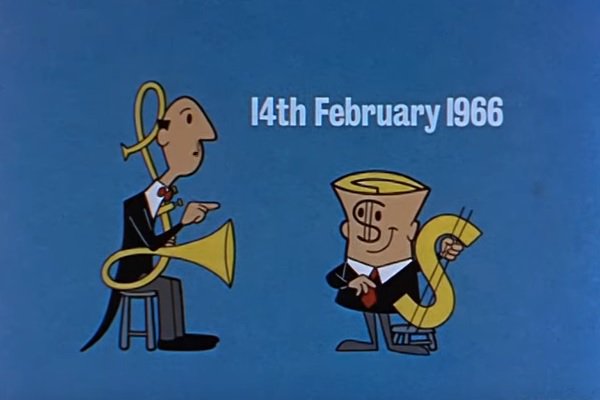Not quite fifty years ago, here in Australia, we made the jump to decimal currency. That change which changed the change in people's pockets, means that it is only the baby boomers and previous generations who remember this and for those of us born later, the past is like a foreign country which issues no visas.
Of course the old lsd. Pound had been decimal of sorts since 1849 with the introduction of the Florin; which even bore the legend "one tenth of a pound" and even if you consider that the current Australian Dollar is worth exactly half of the Australian Pound, the ten cent coin is equivalent to the shilling, which means that there were in effect ten shillings to the Dollar.
Of course legislation doesn't come about spontaneously; there must obviously be people who made the decision to make the change and the forces which push people to make those changes had been active for years before D-Day finally came to be.
Prior to 1959, Australia didn't really have what we would consider to be an independent central bank. Before the passage of the Banking Act 1959, the functions of central banking were done by the Commonwealth Bank, which was still government owned.
Following the Second World War, Chifley's Government found itself with problems to do with the supply of money and credit. It had proposed to merge the state banks with the Commonwealth Bank but this faced opposition from the High Court as well as the banks and Chifley's proposal for the total nationalisation of the banks, is probably what cost him the 1949 election and was the start of Labor being in the wilderness until 1972.
Herbert "Nugget" Coombs who became Governor of the Commonwealth Bank argued that banks shoud have more control over their liquidity and wanted to see proper market-based monetary policy. Naturally when the Reserve Bank of Australia was finally set up in 1960, Nugget was selected as its first Governor.
Almost concurrently, the working party which looked into the creation of a central bank, also set up a Decimal Currency Committee to look into the benefits of a change. Its report was submitted in August of 1960 and put forward the date of the 11th of February 1963 as the suggested change-over date. Australia found itself with more pressing issues such as the Vietnam War and did what governments do best, it dithered.
I have no idea of what the value of total notes in circulation was in 1963 but the total value of all Australian coins issued to that date (from 1910 to 1963) was £47.5 million in all. The expected replacement cost was estimated at just over £31.7 for all notes and coins and that included the building of the Royal Australian Mint and all the machinery needed.
Prince Phillip opened the mint in February 1965 and it started spitting out coinage, to be ready for the changeover on the 14th February 1966. The public was treated to information films and adverts on their new fangled television sets (except not in colour, that would not arrive until 1975).
- From the National Film & Sound Archive
Link: https://www.youtube.com/watch?v=5ZTeWLA1LAsDollar Bill helpfully took us through a simple calculation to show off the virtue of the new system. The real irony with the benefit of hindsight is that most people today probably wouldn't bother to do that calculation because they have more computing power in their phone than they entire of the CSIRO had in 1966 and would just get it to do the arithmetic for them.
Like most countries which made the jump across the decimal divide, Australia decided to keep the coinage sizes of the principal pieces of currency the same. Whereas there used to be a jump from two to ten shillings, under the new decimal regime, the fifty cent coin filled the gap but used a blank which had never been used before in Australia. The fifty cents was on the old half crown planchette and what killed off the round fifty cent coin wasn't that it was mistaken for the twenty cent coin but that the value of silver in the coin ended up being worth more than the face value of the coin as the new currency tanked on world markets.
The road to decimal currency was inevitable and other countries like New Zealand and Great Britain followed soon after but I still think that something was lost. The cold efficiency of doing calculations might have made life easier but for larger amounts, whole pounds were already being stated in account books.
Take salaries for instance: an amount like $77,000 which is about the average for AWOTE. Divide that by twelve to work out your monthly salary costs and you get $6416.66 which is inelegant and inexact. Divide that same number in pounds, shillings and pence and you get £6416/13/4 exactly.
Of course you do end up with idiocies due to inflation, with the Sydney Morning Herald now costing the equivalent £1/5/- but that's expected.
With the force of legislation, centuries of tradition were thrown into the dustbin. The mental agility of shopkeepers and retail staff which once existed has now been replaced by slack jawed dullness. Old "Bob", his mate "Zack" and their little brother "Trey" were all shown the door and the romance of buying a pie for 1/6, a pint for 1/2 and kindly advice are also all gone.
The past is a foreign country; they do things differently there.
- The Go-Between, LP Hartley (1953)


No comments:
Post a Comment